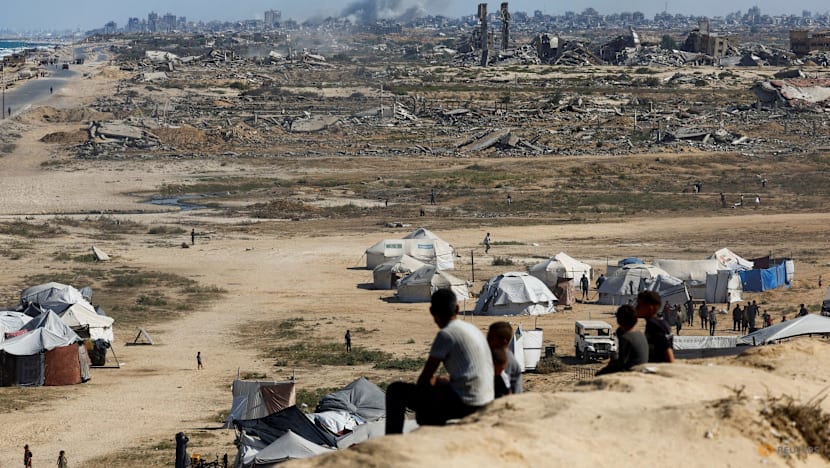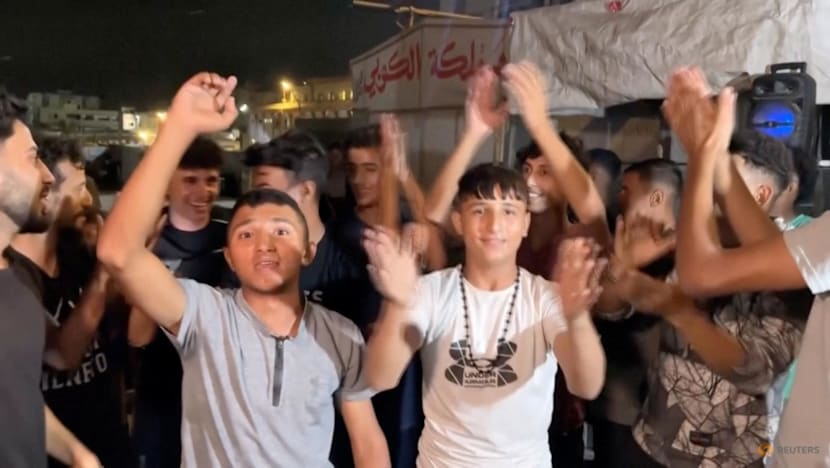Trump’s Gaza deal: What we know so far
Despite the hopes raised for ending the war in Gaza, crucial details are yet to be spelled out.

Palestinians look on as smoke rises following explosions in Gaza City, as seen from central Gaza Strip on Oct 5, 2025. (File photo: REUTERS/Mahmoud Issa)
SHARM EL SHEIKH, Egypt: Israel and Hamas on Thursday (Oct 9) agreed to a ceasefire deal to free the living hostages in exchange for hundreds of Palestinian prisoners held in Israeli jails.
Here is what we know so far about the agreement that was reached in indirect talks in Egypt:
HOSTAGE, PRISONER RELEASES
Hamas will release 20 living hostages in one go as part of the first phase of the deal, according to a source close to the Hamas negotiating team.
Israel will release nearly 2,000 Palestinian prisoners: 250 among those serving life sentences, and 1,700 others detained since the start of the war, a top Hamas official within Hamas told AFP, also on condition of anonymity.
There has been no indication that Israel will disclose the names of those set for release.
The office of Israeli Prime Minister Benjamin Netanyahu said the agreement to secure the release of hostages would only take effect after receiving cabinet approval.
"Contrary to Arab media reports, the 72-hour countdown will begin only after the agreement is approved in the cabinet meeting, which is expected in the evening hours," Netanyahu's office said.
Of the 251 people abducted during Hamas's Oct 7, 2023 attack which sparked the war, militants still hold 47 in Gaza, including 25 the Israeli military says are dead.
PRISONER LISTS
A key point in the negotiations was a list of Palestinian prisoners submitted by Hamas which it wants released from Israeli jails in the truce's first phase.
High-profile inmate Marwan Barghouti - from Hamas's rival, the Fatah movement - is among those the group wanted to see released, according to Egyptian state-linked media.
Barghouti, who was sentenced to life in 2004 on murder charges and is considered a terrorist by Israel, often tops opinion polls of popular Palestinian leaders and is sometimes described by his supporters as the "Palestinian Mandela".
AID
A daily minimum of 400 trucks of aid will enter the Gaza Strip for the first five days of the ceasefire, to be increased in following days, the Hamas source said.
It also provides for the "return of displaced persons from the south of the Gaza Strip to Gaza (City) and the north immediately", the source added.
The World Health Organization chief, Tedros Adhanom Ghebreyesus, said his agency was prepared to "scale up its work to meet the dire health needs of patients across Gaza, and to support rehabilitation of the destroyed health system".
The UN agency for Palestinian refugees welcomed the deal as a "huge relief", and said it was ready to flood Gaza with desperately-needed food.
"We have enough to provide food for the entire population for the coming three months," the agency's chief Philippe Lazzarini said on X.

"SCHEDULED WITHDRAWALS"
The deal stipulates "scheduled withdrawals" of Israeli troops, the Hamas top official said, and includes "guarantees from President Trump and the mediators".
The Israeli military said on Thursday it was preparing to pull back troops in Gaza as part of the deal.
KEY QUESTIONS REMAIN
Trump's 20-point peace plan, on which the indirect negotiations were based, calls for the disarmament of Hamas and for post-war Gaza to be ruled by a transitional authority headed by Trump himself.
But these points are yet to be addressed.
Palestinian president Mahmud Abbas said he hoped the Gaza deal could lead to the establishment of an independent Palestinian state.
But Netanyahu and members of his cabinet have repeatedly vowed to prevent this from happening.
WHAT'S NEXT?
The deal will be formally signed later on Thursday in Egypt, a source with knowledge of the agreement told AFP on condition of anonymity.
Israel's cabinet will meet Thursday at 3pm GMT (11pm, Singapore time) to discuss a plan to secure the release of all hostages held in Gaza, a government statement said.
Far-right Finance Minister Bezalel Smotrich says he will not vote in favour.
A Hamas official said negotiations for the second phase of the ceasefire would begin "immediately".
Negotiations in Egypt's resort town of Sharm El-Sheikh are taking place under lock and key in a conference centre.
Al-Qahera News, linked to Egypt's state intelligence, broadcast footage showing negotiators from Hamas, Turkey, Qatar, Egypt and the United States embracing and walking in high spirits.
But Hamas and Israeli delegates were positioned in two different rooms, with mediators shuttling between them, and with no indication that the foes would ever meet.
WHAT ARE THE BIGGEST RISKS TO THE DEAL?
Successful completion of the deal would be Trump's biggest foreign policy achievement to date.
Hamas has so far refused to discuss Israel's demand that the militant group give up its arms. A Palestinian source said Hamas would reject this as long as Israeli troops occupy Palestinian land.
Two sources familiar with the talks confirmed that sticking points included the mechanism for the Israeli withdrawal, with Hamas seeking a clear timeline linked to the release of hostages and guarantees of a complete pullout by Israeli forces.
Within Gaza, Israel has dialed down its military campaign at Trump's behest, but it has not halted strikes altogether.
Arab countries say the plan must lead to eventual independence for a Palestinian state. Netanyahu says this will never happen.
Hamas has said it would relinquish Gaza governance only to a Palestinian technocrat government supervised by the Palestinian Authority and backed by Arab and Muslim countries. It rejects any role for Blair or foreign rule of Gaza.
The list of Palestinians that Hamas wants freed was expected to include some of the most prominent prisoners ever jailed by Israel, whose release had been off limits in previous ceasefires.
According to a Palestinian source close to the talks, the list includes Marwan al-Barghouti, a leader of the Fatah movement, and Ahmed Saadat, head of the Popular Front for the Liberation of Palestine. Both are serving multiple life sentences for involvement in attacks that killed Israelis.
















